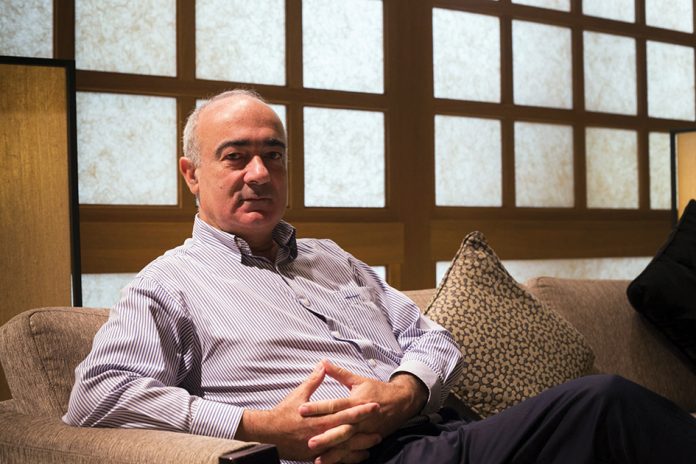One of the top gaming law experts at the University of Macau, Jorge Godinho, published a book last year on the history of local gambling since 1849. Now that concessions are coming to an end, there are lessons to be learned from history, he advises…
MB March 2020 Special Report | Cotai 3.0 (2019-2022)
What has happened in these 20 years in Macau, from a gambling standpoint, was not predictable to anyone it is often heard. As a Macau resident, do you agree?
Jorge Godinho – Of course. In 2001, no one could see all this massive development happening. Everyone was very prudent, and the “bad days” of the crime wave were still very fresh in the memory.
Looking at the documents of the time, particularly those you cite in your book, is this idea reinforced?
J. G . – While it was believed in 2001 that there was potential to grow by ending the monopoly and introducing some competition, the expectations were not very high. The decision to go for three concessions only should be read in this vein, as a careful and incremental move.
The six operators eventually did more work than what was contracted. Is that another sign?
J. G . – This happened because there was a curious shift. At the beginning, in 2002, almost nobody was interested in investing in the Cotai, and the vast majority of the work contracted was in the Macau peninsula. Then suddenly, around 2007 when the Venetian opened, everyone realized that the Cotai was going to be a huge deal, and all operators asked for land there, which the Government provided to all six.
The three subconcessions were a ‘legal mistake’ that greatly helped Macau gambling to develop, another opinion I would like you to comment on.
J. G . – The first subconcession was a clever and Solomonic way to solve the problems created by the split between Galaxy and LVS/Venetian. It was a smart practical move. In retrospect, it was a quite a twist, in that it ended up being the root cause of an effective duplication of the number of operators that happened just a few years after the tender.
“[in 1961] Tai Heng was overconfident and did not prepare and bid properly”
Overall, how do you rate the 2001/02 tender? Do you think there are lessons that can be learned for others?
J. G. – The tender of 2001/02 was a success because it attracted many reputable and experienced international gaming companies. On a practical level, it was perhaps a bit rushed and should have been conducted with more time, to give everyone plenty of room to prepare. Some of the criteria used were arcane, others were correct. The only flaw is that, as far as I know, the weight of each factor was decided only after the bids were submitted. In any event, tenders on the “beauty contest” model are always complicated. In this model, there are various quantitative and qualitative criteria set by law and the process is inherently more complex, as it is not simply a matter of determining which bid is the highest.
This special report that underlines the idea that operators, by generously announcing works to be opened in 2021 or even 2022, behaves as if the competition were a renewal of their licenses (ie without risk of losing their license). Is it normal to be so?
J. G. – I am not sure about what they are thinking. What I know is that in a public tender, anything can happen. A public tender is a ‘Big Bang’ moment. Everything ends and starts again. Perhaps if Tai Heng was more focused, prepared, and committed in the 1961/62 tender, they would not have lost and Macau would not look the same today. All indications seem to be that Tai Heng was overconfident and did not prepare and bid properly. Public tenders should be taken very seriously. It is not a formality.
From your point of view, is there room for (at least) one more operator?
J. G. – There should be at least one more concession, if not two more. What I have been saying for a while is that it would be a mistake to open a tender for six concessions, especially because you would not get only six applicants. If you want exactly six, just extend the existing ones and do not open a tender.
“Suddenly, around 2007 when the Venetian opened, everyone realized that the Cotai was going to be a huge deal, and all operators asked for land there.”
“There should be at least one more concession, if not two more. (…) If you want exactly six, just extend the existing ones and do not open a tender.”

For the termination of concessions, by these or other operators, to be granted by 2049 this would require an extension of five years plus two (5+2=7). Do you think it is premature to think about now in 2049 or can this scenario make any sense?
J.G. – Now is too early. Current law states a maximum 20 years plus a maximum extension of five years. That will put us in 2047, two years before the end of 50-years period stated in the 1987 Sino-Portuguese Joint Declaration. The situation beyond 2049 does not have to be addressed now, but all indications are that gaming will have to continue.
“This world title is not going to be taken away from Macau anytime soon!…”
”After 160 years of a very complex evolution full of twists and turns, Macau became, almost by accident, the biggest jurisdiction by revenue for land-based casino games of chance”
About your book: what was the most difficult period to systematize / interpret? For lack of sources?
J. G – The problem of lack of sources was the major obstacle throughout, from the 1840s to today. One period that was particularly difficult to research was the 1940s and 1950s. The war years are always a challenge, but what happened afterwards was even more obscure. I would say that the 1950s were not a brilliant period in the history of Macau. Then everything changed with the arrival of Governor Silvério Marques in 1959, who was the driving force of the return to public tenders and the modernization of the concessions in 1961, a major reform that set the stage for STDM and all that followed.
Do you think we know the essentials about the 2001/02 tender, or is there room for future details, including the criteria for the 21 competitors?
J. G – It is always possible to know more. I am sure historians and researchers will keep investigating what happened.
Would you risk adding to the book’s title (Macau Casinos) a sentence that describes what has happened since 1849 (a kind of subtitle)?
J. G – It’s already there: “The World’s Largest Gaming Market”. After 160 years of a very complex evolution full of twists and turns, Macau became, almost by accident, the biggest jurisdiction by revenue for land-based casino games of chance. This was based on a phenomenal growth of Baccarat since the mid-1970s. Such growth was never planned or intended, and even today we do not seem to talk much about it, but it happened. And this world title is not going to be taken away from Macau anytime soon!…
























